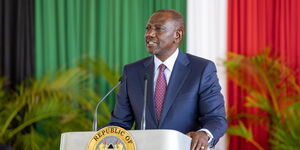The European Union has flagged the delayed reforms at the Independent Electoral and Boundaries Commission (IEBC) as a major cause for concern ahead of the 2027 General Election.
In the final report of the European Union Election Follow-up Mission (EU EFM) to Kenya, the EU highlighted the delayed reforms and concerns over the independence of a future Commission free from political interference.
“Most EU EFM interlocutors raised concerns about the ability of a future commission to operate as an independent body objectively and transparently, emphasising that public perception of the IEBC is largely negative,” the EU noted in its report.
According to the EU, the electoral management body is viewed as weak and vulnerable to interference from the political establishment.
In terms of IEBC reforms, the EU noted that despite the recent appointment of IEBC chair Erastus Ethekon and his team of Commissioners by President William Ruto, prior delays in their appointment were likely to prove costly.
The EU listed pending by-elections, five for the National Assembly and four at the county level, overdue constituency delimitation, and postponed voter registration as key areas of concern regarding preparations for the 2027 elections.
Further, the EU raised the alarm over the lack of an approved strategic plan that outlines, in detail and with specific deadlines, the actions and activities of the IEBC ahead of and beyond the next electoral cycle.
The issue of funding was also highlighted. The EU stated that underfunding and delays in allocating funds for the 2027 polls would significantly hamper the electoral process.
The IEBC has requested a budget of Ksh 61 billion (approximately EUR 435 million) for the 2027 General Election, but the government has allocated only Ksh 55 billion (approximately EUR 390 million), with a request that the amount be spread over five years.
“To address this funding gap, the IEBC must seek support from development partners, especially for voter education campaigns and training of electoral staff,” the EU noted.
The latest comes after a recent TIFA report released in May disclosed that 50 per cent of Kenyans had no confidence at all in the integrity of the 2027 elections.
According to the report, which was released on Wednesday, May 5, Kenyans believed that the upcoming general polls would mainly be compromised by factors such as political interference, graft, and failures of the Independent Electoral and Boundaries Commission (IEBC).
TIFA has further noted that 18 per cent of other Kenyans believe that other factors, such as insecurity, refusal of the president and other candidates to accept defeat, technological failures, a history of rigging, and insufficient time to prepare for the elections, will sabotage the integrity of the upcoming elections.












